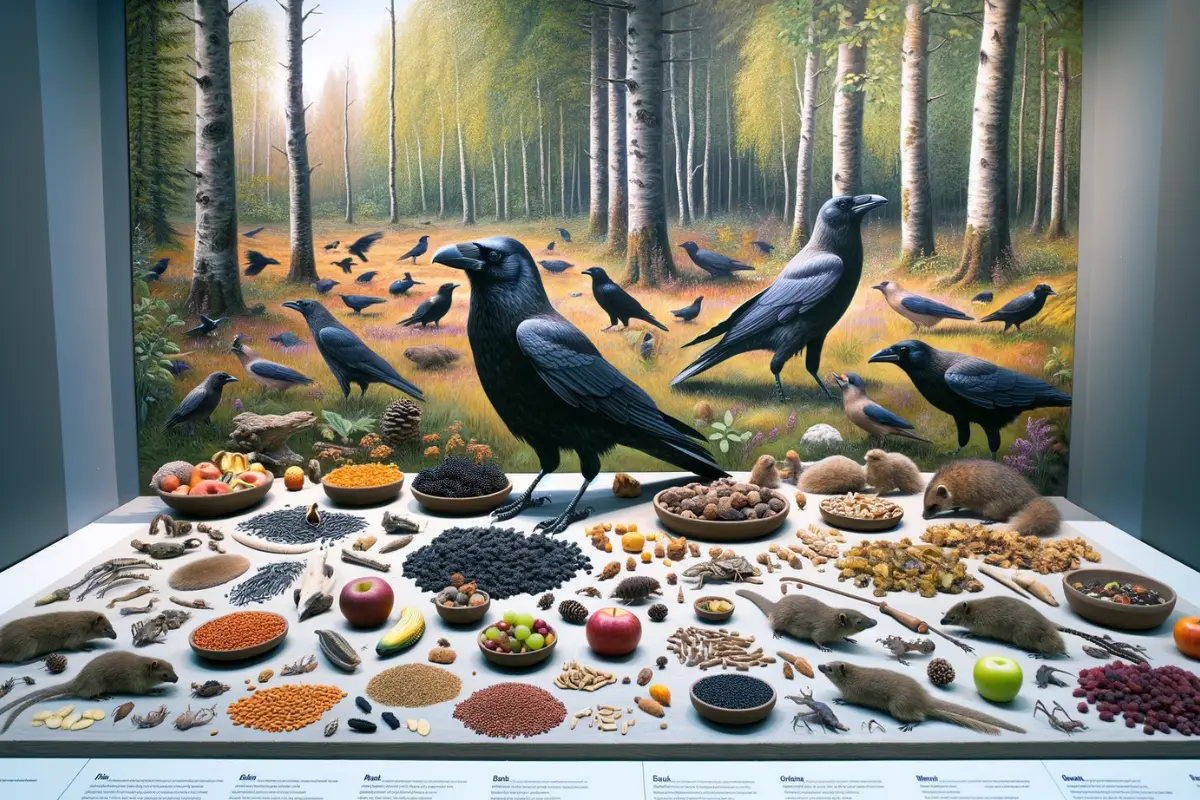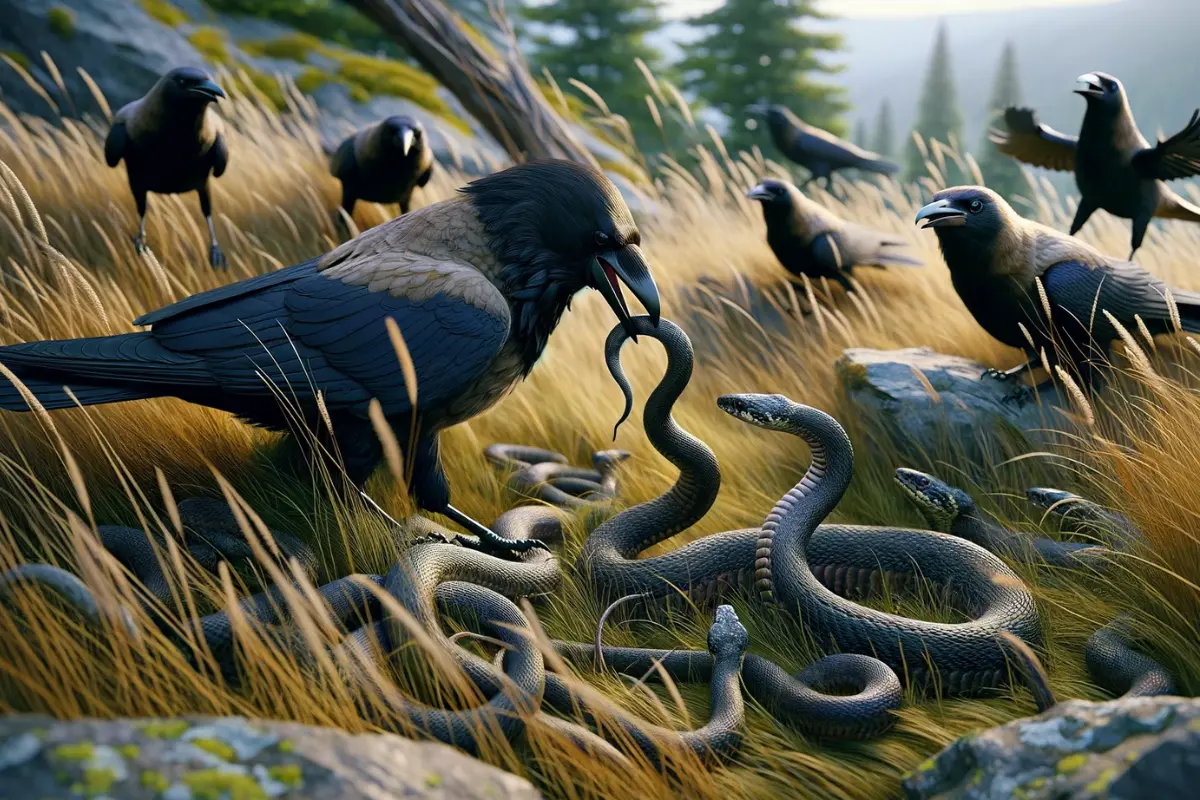Crows are monogamous, which means that they mate for life. Once they mate, they live together for years. However, there can be some exceptions to this. They may mate with other mates but also remain with the first mate. Because of this behavior, some call them “monogamous but promiscuous.”
There are some benefits for crows of remaining committed to one mate. It gives their species a genetic benefit; the parents can share the labor, cooperate in building nests, suffer from lower stress, and feel more protected and safe.
Different factors like age, experience, availability of mates, and other environmental factors influence their monogamy. Let’s explore the benefits and the factors in detail.
How Do Crows Attract A Mate?
Male crows perform some rituals to attract the female crows. They usually reach maturity when they are about two years old. However, they do not mate till they reach 4 years of age. Once they reach maturity, male crows spread their feathers and bow their heads to attract female crows.
When a female crow expresses its interest after the offerings, the male crow will perform some dives. It tries to impress its counterpart with its flight skills. If the female crow finally accepts the male as her mate, the two will fly together and perform other courtship rituals.
Cloacal Kiss: Process Of Mating
A major courtship ritual of mating crows is a cloacal kiss. When both males and females accept each other as partners, the male and female birds come closer and rub their cloacas together. The cloaca is one of the organs that contribute to birds’ reproduction.
The male crow transfers its sperm to the female crow during the cloacal kiss. Here is an interesting fact that you may not know that male crows do not have external penises. The absence of this organ does not disrupt their reproduction. Performing the cloacal kiss helps them reproduce successfully.
What Happens When A Crow Mate Dies?
Both male and female crows stay committed and loyal to each other. They mate for life. However, if one of the pairs dies or gets injured or is unable to breed, the other partner may become involved in a relationship with other birds. It is a common habit of both male and female crows.
Crows indeed develop a strong bond with their partners. However, once a partner dies, the other does not mourn. They simply move on and repair with other birds. This is a part of their instinct to keep their species going along while feeling safe and secure.
Benefits Of Monogamy For Crows
Crows mate for life as it helps them achieve different benefits. When a pair of crows stay together, they enjoy the following benefits:
1. Genetic Benefits
The monogamous habit of crows increases the survival rate of their offspring. Different research shows that crows’ offspring have a higher survival rate than other birds. A major factor contributing to this is their monogamy habit. As the parents take part in looking after the children and collecting food, the chicks are never alone. It saves them often from predators.
2. Division of Labor
Crows live in a colony where they all have different roles. As they are monogamous and live as pairs, it helps them distribute the labor themselves more efficiently. The male crow may stand on guard while the female crow works on the nest maintenance. This is important for them as crows live in the same place for a long time, as crows usually do not migrate.
Additionally, the distribution of labor maintains harmony in their society. They can take turns looking after the young crows and taking proper care of them.
3. Strong Pair Bonds
Crows are intelligent birds, and you will find this proof in many of their activities. Their remaining with a single partner for a long time is also a demonstration of their being intellectual. As the birds stay together and share responsibilities and activities, they build up a strong bond. The strong bond between the parents helps the offspring grow in a more healthy environment.
4. Take Turns in Parenting
Crows take parenting with much responsibility. The parents share their responsibilities to ensure the babies get proper care and are never alone. The male crow often remains on guard of the nest, while the female crow looks after the children.
Additionally, both male and female crows take turns in searching for food. It ensures proper food supply for the young crows. The chicks are taught different survival behaviors by both mother and father crows.
5. Territory Protection
You may have noticed that the crows that fly around in your area in the daytime are not seen at night. Where do the crows sleep, then? Crows choose a vast area where they can live collectively as a colony.
Protecting their territory is another reason for their mating for life. They do not want to let their area be intruded by other crows or other animals. A pair of partners work together with cooperation to defend their territory.
6. Happiness and Lower Stress Levels
Another major reason for crows to stay committed to their partners is peace and happiness. As a pair remains together, they do not have to look for new partners. It maintains a balance in their society.
Polygamous birds often do not take responsibility for rearing children. It results in a lower chick survival rate. Besides, the males do not have to impress newer females very often. Once they find a mate, they know that they can stay together for life. It reduces the risk of loneliness and saves them from stress.
7. A Sense of Safety
When two male and female crows mate, they remain together most of the time. They may share responsibilities and take turns in various actions, but it gives them security that one of the partners will be safe to look after the children. The couple trusts each other and feels safe around each other.
Factors Affecting Crow Monogamy
A successful mating requires different qualities among crows. There are various factors that help them mate for life.
1. Age and Experience
Unlike most other birds, crows do not engage in mating courtship as soon as they mature. They take more time to age and gain experience. Age provides them with more experience and wisdom. They can make their decisions after thorough observation of a potential mate.
As the birds take part in mating after being experienced, the chance of successful breeding is high. It keeps them satisfied and prevents them from looking for another partner. With age, they already learn different techniques and skills that help them successfully mat.
2. Availability of Mates
Though crows are monogamous, there can be some exceptions. Their social dynamics and availability of mates play an important role here. If, in a certain colony, the ratio of the number of male and female crows gets disproportionate, it becomes easy to find a new mate.
For instance, if a colony has more female crows than male crows, it becomes easy to win a female mate. However, the availability of so many mates influences them to date another crow. Both male and female crows show this behavior. However, they do not leave their first mate as long as they are capable of doing their duties. They just take advantage of available opportunities.
3. Environmental Factors
Environmental factors can also influence the monogamy of crows. If there is enough space for nesting, food resources, and a good environment to live in overall, crows may remain dedicated to a single partner.
Changes in climate and their territory often lead them to migrate. Their partners can die, and so the crows may look for new partners.
FAQs
Do all corvid species mate for life?
Yes, all the corvid or crow species mate for life. Whether it is magpies, ravens, carrion crows, American crows, or jackdaws, they all show this behavior. Though some of them may mate sooner than others, all of them remain loyal to their partners.
Do female crows mate with each other?
There is yet no evidence of two female birds mating. It is difficult to distinguish between male and female crows from a distance. However, there is still no evidence of such behavior among these birds.
Is there anything like “Dating” among crows?
This might be surprising, but crows also have a dating phase in their early mating courtship. When male and female crows show interest in each other, they fly together and dive off branches. From dating, they can go to the next stage of mating or end the relationship.
Do crows cheat on their partners?
Crows are one of the few bird species that mate for life and remain loyal to their partners. However, different studies have found evidence of them cheating on their partners.
How long do crows live?
The lifespan of crows can vary depending on the species. While American crows can live between 7 to 8 years, common ravens can survive up to 15 years. Australian ravens, on the other hand, live for about 22 years.
How long do crows stay with their parents?
This habit depends on the specific species. American crows keep their children with them for about five years, or sometimes even longer. Some species may abandon them after the breeding season and or chase them away after hatching.
Do crows stay together as a family?
Many crows live in family groups for safety and protection. The mated crows share a territory where they rear their children. However, some crow species might not form large groups. But usually, these intelligent birds form colonies for safety.
Are Crow mates aggressive?
Crow mates can be aggressive if they feel their patterns are being harassed. They might hiss and cry in harsh tones and even sometimes attack physically. A mated crow can be harsh to other crows as well as other birds or animals.
Do crows understand each other?
Yes, crows understand each other. They have different vocalizations to maintain an effective communication approach. If you listen carefully, they caw, click, and coo in various situations. Each of these sounds has distinct meanings understood by other crows.
Conclusion
Crows are indeed monogamous, and it is beneficial for them in various ways. They can maintain a positive environment for the chics to grow up. It reduces their stress and makes them feel more secure and protected. There can be some exceptions under different circumstances; they are, in general, loyal to their partners.







